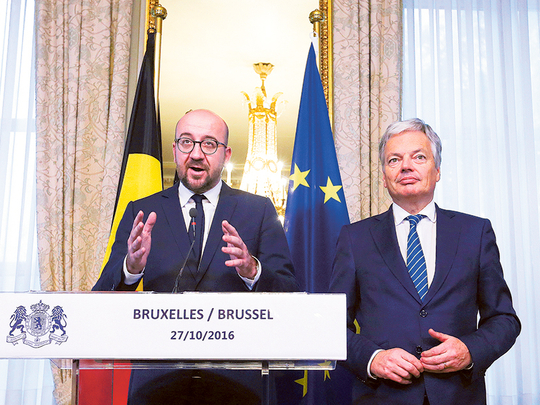
Brussels: Belgium reached a deal with the country’s regional parliaments to approve a trade agreement between the European Union and Canada, ending a deadlock that has delayed the accord’s signature.
Belgium Prime Minister Charles Michel said the EU-Canada deal can be approved by the nation’s regions “by tomorrow at midnight”. The agreement is an “important step for EU and Canada,” Michel said in a post on Twitter on Thursday.
The approval means the EU and Canada can now move ahead with one of the world’s most ambitious and far-reaching trade pacts. The delay in concluding the deal has raised concerns about the prospects of agreements now under negotiation between the EU and the US and Japan, as well as the accord with the UK after it leaves the bloc.
Belgium’s federal government had been unable to persuade the Walloon regional parliament in the country’s south to sign up to the proposed pact. The EU and Canada cancelled a summit planned for Thursday at which the two sides would have signed the Comprehensive Economic and Trade Agreement, or CETA, which has taken seven years to negotiate.
Good news
“I am glad for good news,” EU President Donald Tusk said. “Only once all procedures are finalised for EU signing CETA, will I contact” Canadian Prime Minister Justin Trudeau.
In holding up the deal, Wallonia, which accounts for less than 1 per cent of the EU’s population, cited concerns about the impact on employment and consumer standards. One particular worry is the accord’s provisions for investor-state dispute settlement, or ISDS, which establish protections for overseas companies, including an “institutionalised dispute-settlement tribunal.”
Wallonia’s stance had tied the hands of the Belgian federal government, which had been in favour of the agreement but needed the endorsement of regional authorities. The other 27 EU nations support the deal, the bloc’s first commercial accord with a fellow member of the Group of Seven industrialised countries.
The EU says the pact would boost its economic output by about €12 billion (Dh48 billion, $13.1 billion) a year and expand EU-Canada trade by about a quarter.
Canada’s Trudeau has warned that the EU needed to prove it was still viable by passing CETA. Failure would prompt questions about “how relevant the European Union continues to be as a political entity,” he said in Toronto earlier this month.












